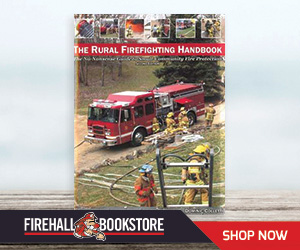| |
| |
| |
 |
|
@{mv_date_MMM d, yyyy}@ |
|
| |
Recent research examined the prevalence of hypertension in male and female firefighters in America, with the results suggesting a need for better screening and management of high blood pressure.
» Read more
A combination of intense heat and drought conditions is causing wildfires in Western Canada to generate their own weather systems, experts say.
» Learn more
A special taskforce of Western Australian firefighters are coming to Canada to help relieve exhausted crews battling the country’s worst wildfires in recent years.
» Read more
|
| |
|
| |

Based on the experiences of evacuees from seven First Nations communities, this book offers guidance to Indigenous communities and those working with them during a wildfire evacuation.
Specific topics include:
-
assessing the risk to the health and safety of community members
-
knowing when to do a partial vs a full evacuation
-
troubleshooting transportation
-
communicating with community members before and after the evacuation
-
arranging appropriate accommodation for evacuees
-
caring for Elders and other more vulnerable community members.
Packed with real-life stories, checklists, and guiding questions, First Nations Wildfire Evacuations gives detailed information on what to expect and how to plan when facing the threat of wildfire.
>> Order your copy now |
| |
|
| |
 In preparing to be hired as a firefighter, many candidates spend time, money and effort on rescue training. Be it ice water, rope, or confined space rescue, these are skills that, once you’re hired, you may or may not continue training in or using on a regular basis. Some of the skills you learned in your rescue training, although valuable, may end up being put on the shelf. I am a strong believer that every training you do should build on the training and experiences that you have, and that everything you learn can be used to make you better at what you do in a more holistic way. By Steve Piluso
» Learn more
In preparing to be hired as a firefighter, many candidates spend time, money and effort on rescue training. Be it ice water, rope, or confined space rescue, these are skills that, once you’re hired, you may or may not continue training in or using on a regular basis. Some of the skills you learned in your rescue training, although valuable, may end up being put on the shelf. I am a strong believer that every training you do should build on the training and experiences that you have, and that everything you learn can be used to make you better at what you do in a more holistic way. By Steve Piluso
» Learn more |
| |
 A Leadership Team (LT) is similar to a rudder. In order to effectively steer an organization in the direction it needs to go, the LT cannot be compromised. LTs, regardless of industry, are vulnerable to external events. But by working together and maintaining priorities (staff), LTs can help build psychologically safe environments that deliver optimal services. By James Rychard
» Learn more
A Leadership Team (LT) is similar to a rudder. In order to effectively steer an organization in the direction it needs to go, the LT cannot be compromised. LTs, regardless of industry, are vulnerable to external events. But by working together and maintaining priorities (staff), LTs can help build psychologically safe environments that deliver optimal services. By James Rychard
» Learn more |
| |
|
| |

The Rural Firefighting Handbook is intended to help rural fire departments examine the fire service of today and see how the department fits into it. It helps determine what is needed to meet the fire protection needs of your community.
It includes tools which a department can use to survey its service area, determine needs, and evaluate the ability to meet those needs.
This text has been expanded with several new chapters on pumps, pump priming and drafting.
» Order your copy now |
| |
|
| |
Fire fighting is a tough and demanding job, where being physically fit is an important component to serving our communities. However, we often forget about our mind’s health, our stress response, and how we can manage the challenges we face daily. This month’s column is about a program called Prosilience that develops resilience. By Arjuna George
» Read more
|
|
Getting strong and getting muscular are two very different things when it comes to training. It is important for athletes (yes firefighters, that’s you) to know what their goals are before setting out on a new training regime. It isn’t wrong to want to improve your physique when you are putting in hard work, but if your aim is to improve your strength for job performance you will want to know the difference. By Sherry Dean
» Read more
| | |
| FIRE FIGHTING IN CANADA: THE PODCAST |
|
|
| |
|
Jennifer Grigg, whose career in the fire service spans 30 years and has expanded to include being a certified body language coach, joins host Fire Chief Tom DeSorcy for a conversation on developing soft skills through the study of body language, which Grigg used to overcome anxiety. Grigg and DeSorcy talk about body language awareness in interviews, developing follow up questions based on body language, how vocal tone, voice and cadence plays into recognizing stress and why it's important to pay special attention to the mouth.
» Listen now |
| |
|
| |
Sept. 14 - 18, 2021
Location: Columbus, Ohio
» Read more
|
| |
| |




